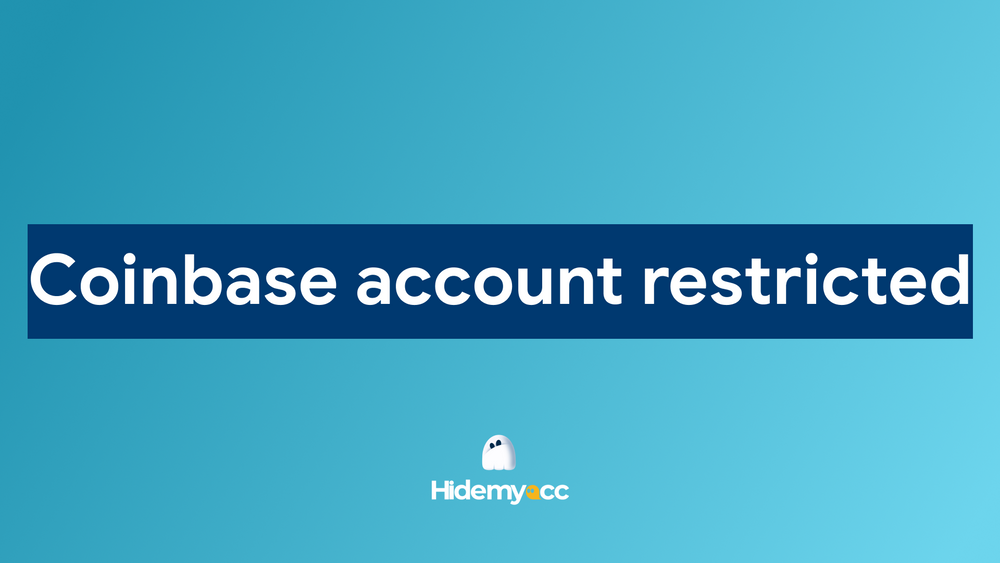Coinbase (https://www.coinbase.com/) is among the world’s most widely used crypto exchanges, trusted by millions for trading and storing digital assets. A common question is: can you have multiple Coinbase accounts? This guide gives a clear answer, explains the difference between Coinbase Wallet and exchange accounts, outlines the risks of creating more than one account, and shows how to manage accounts more effectively with tools like Hidemyacc.
1. Can you have multiple Coinbase accounts?
The short answer is no. Coinbase does not allow one person to have multiple personal accounts. According to Coinbase’s official policy, every individual can only register one verified personal account. If you try to open more than one, Coinbase may detect it and either suspend or permanently close the duplicate account.
This strict rule exists because Coinbase is a regulated exchange that must follow KYC (Know Your Customer) and AML (Anti-Money Laundering) laws. Each user’s account is linked to their government-issued ID and bank account, which makes it very easy for Coinbase to spot multiple accounts under the same person.
So, if you are wondering “Can I have two Coinbase accounts for personal use?” - the answer is no. Creating more than one personal account is against Coinbase’s terms of service.
2. Are there any exceptions?
Even though multiple personal accounts are not allowed, Coinbase does allow users to have both a personal account and a business account. The personal account is used for individual trading, while the business account is reserved for companies, LLCs, or organizations. This means that if you are a business owner, you may legally run a personal Coinbase account and a business Coinbase account at the same time. For example, a freelance trader can use their personal account for investments and their LLC’s account for client payments. This setup is completely compliant with Coinbase’s rules and avoids the risks of suspension.
3. Coinbase wallet vs Coinbase exchange accounts
A lot of confusion comes from mixing up Coinbase Wallet with Coinbase Exchange accounts. These two services may seem similar, but they serve very different purposes.
Coinbase Wallet is a self-custody wallet app where you control your private keys. Inside this app, you can create multiple wallets and addresses. It is also possible to import or export wallets using your 12-word recovery phrase or private key. In practice, this means you can keep one wallet for Ethereum, another for NFTs, and another for DeFi projects. You can have as many wallets as you need without breaking any rules, since Coinbase Wallet is fully designed to support multiple wallets.
By contrast, a Coinbase exchange account is the account you use on Coinbase.com or in the Coinbase trading app. Here, only one verified account per person is allowed. Even if you try to use different emails or bank accounts, the verification process will still tie your identity to a single user. This is why Coinbase exchange accounts are strictly limited, while Coinbase Wallet is flexible.
4. Risks of creating multiple Coinbase accounts
Trying to create multiple Coinbase accounts can be risky. Coinbase has very advanced systems to detect duplicate users. The exchange can track accounts in many ways. First, it can use IP address tracking. If you log in from the same IP address on different accounts, Coinbase can easily link them together. Second, it uses device fingerprinting, which means Coinbase can analyze your browser type, device details, and even typing behavior to identify who is behind an account. Third, linked bank accounts are a major red flag, since if the same bank is connected to more than one account, the system will flag it. Finally, ID verification ensures that every account is linked to a government-issued identity, making it almost impossible to bypass these checks.
The consequences of being caught with multiple accounts can be serious. In some cases, Coinbase may give you a warning and fifteen days to close the extra account. However, in more serious cases, both accounts may be permanently suspended. Losing access to funds because of violating Coinbase’s rules is a real risk, which is why creating duplicate accounts is not recommended.
5. Legitimate cases for multiple accounts
There are situations where multiple accounts are allowed. For instance, you may have one personal account and one business account if you operate as a company or LLC. Institutions, such as funds or agencies, may also open institutional accounts for trading at scale. Additionally, developers who are creating plugins or fintech tools may apply for extra accounts for testing purposes. In all of these cases, the accounts are registered and verified officially, which makes them compliant with Coinbase rules.
6. Managing multiple accounts with Hidemyacc
Even though Coinbase does not allow multiple personal accounts, some users such as businesses, agencies, or developers may still need to handle several Coinbase accounts. This is where Hidemyacc becomes useful.
Hidemyacc is an antidetect browser and account management tool. It allows you to create multiple browser profiles, each with a unique fingerprint, cookies, and browsing environment. Every profile acts like a completely different device, which is useful if you need to separate account activity.
For Coinbase users, Hidemyacc brings several advantages. Each Coinbase account can run in its own browser profile with a separate digital fingerprint, which makes them harder to connect. Proxies can also be added to each profile, giving every account a unique IP address. At the same time, cookies and cache are fully isolated, which prevents overlap between logins. This makes Hidemyacc especially helpful for agencies managing multiple Coinbase business accounts or developers working with accounts in different regions.
The main reason to use Hidemyacc is safety and organization. Instead of switching devices or clearing cache manually, you can keep every Coinbase account separate and secure. However, it is important to remember that Hidemyacc should only be used for legitimate and compliant purposes. Businesses, agencies, or testing environments can benefit greatly from it, but using Hidemyacc to break Coinbase’s rules could still result in suspension.
7. Conclusion
So, can you have multiple Coinbase accounts? The answer is no for personal users. You can only have one verified personal account. However, Coinbase does allow a personal account and a business account at the same time, and Coinbase Wallet lets you create as many wallets as you need.
If you want to separate funds, the best options are using Coinbase portfolios or creating a business account. And if you are managing multiple accounts for legitimate reasons, tools like Hidemyacc can help you stay organized and reduce risks.
The most important thing is to always follow Coinbase’s rules. Trying to cheat the system can lead to suspension, but using the right tools and features will keep your trading safe and compliant.
>>> Same topic Crypto:
- Can I have multiple MetaMask wallets? Here’s what you need to know
- Is it possible or impossible to create multiple Binance accounts?
8. FAQ
Can I have two Coinbase accounts with different emails?
No, Coinbase will still link them through ID and banking details, so having multiple personal accounts is not allowed.
Can I have one Coinbase account for myself and one for my business?
Yes, this is permitted. A personal account and a business account can exist together without violating the rules.
Can I create multiple Coinbase Wallets?
Yes, Coinbase Wallet supports multiple wallets and addresses. This is different from exchange accounts and is fully allowed.
What happens if Coinbase finds out I have two accounts?
You may receive a warning to close one account, or in more severe cases, both accounts could be permanently suspended.
How can I manage multiple Coinbase accounts safely?
If you are a business or agency, you can use Hidemyacc to keep accounts separate and secure while reducing risks.






